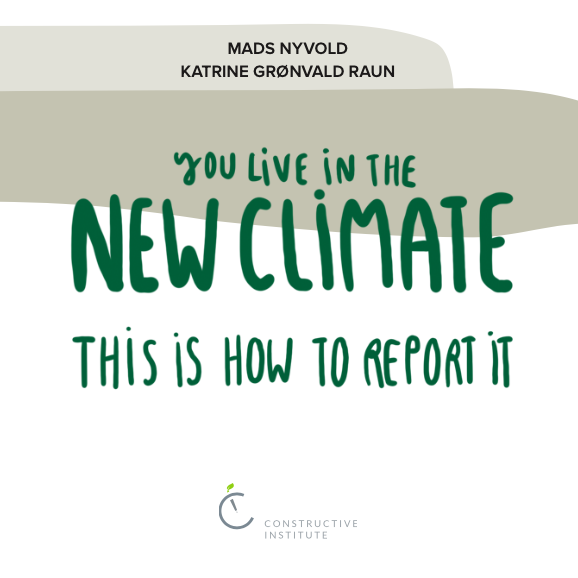Africa is on the frontline of climate change, but seldom front page news. Current headlines are dominated by conflict and disaster.
We’re working with pan-African news industry leaders and innovators to change the narrative using constructive reporting techniques.
The African COP
COP27 in 2022 was held in Egypt and billed as the first “African COP”. We partnered with the Danida Fellowship Centre to train and support a group of 24 African journalists covering the climate change agreement – and how it is being implemented on the continent.
It resulted in more than 100 climate stories in 30 prominent media outlets across Africa, reaching hundreds of thousands of people. Check out the full program here and hear from the journalists involved in the video to your right.
Africa Climate Summit
In 2023, the Constructive Institute will again partner with the DFC to prepare and mentor a new group of African journalists to help them constructively cover climate change and climate action on their continent.
This time, the journalists will attend the Africa Climate Summit co-hosted by Kenya and the African Union. The African Climate Summit brings together government delegations, representatives from UN agencies, multilateral development institutions, financial organizations and the private sector, all committed to addressing the urgent climate challenges facing Africa.

In addition to our trainings with the DFC, we have also partnered with the Danish Embassy in Nairobi and the Kenya Editors Guild to explore the possibilities, limitations and use cases of constructive journalism in East Africa.
How constructive tools can support better climate coverage
The changing climate is one of the biggest stories of our time, but journalists have struggled to convey the urgency of the issue. Ugandan Climate Activist Vanessa Nkate has described how Africa is on the frontline of the climate crisis, but not covered in the front pages of the world’s newspapers.
The existing coverage is bleak. Africa No Filter found that even in local media, 81% of news stories classify as “hard news” – for example, largely political conflicts and crises – while 13% focused on political violence, civil unrest and armed conflict. International organizations dominate the discussion on climate change in Africa, with a focus on climate disaster rather than mitigation politics.
But climate change and its environmental impacts are not just a story of suffering and conflict – they are also about possibility and the potential to transition to a cleaner, more sustainable world. Just as the continent leapfrogged cumbersome landline telephone infrastructure and went straight to mobiles, African countries could roll out electricity for their citizens who are currently off the grid and industrialize their economies with sustainable sources.
Given the overwhelmingly negative picture, it’s no wonder media organizations are grappling with climate anxiety and disengagement with the news. Informed by the work of our Constructive Institute Fellows (see their fantastic guide on the right) and the European Broadcasting Union, we know that news audiences, particularly young people, want something different – namely, a focus on solutions and concrete actions that can be taken to help solve the crisis.
That’s where constructive journalism comes in. Constructive reporting on climate change in Africa clearly outlines the significant challenges facing the continent, but also points to local action and possible solutions for a sustainable and equitable future.
Through our work with the DFC and other local and international partners, we hope to spread constructive journalism practices across the African continent in order to support journalists in telling one of the most important stories of our time.
Want to join us? Contact Cynara Vetch, International Project Lead at the Constructive Institute.

